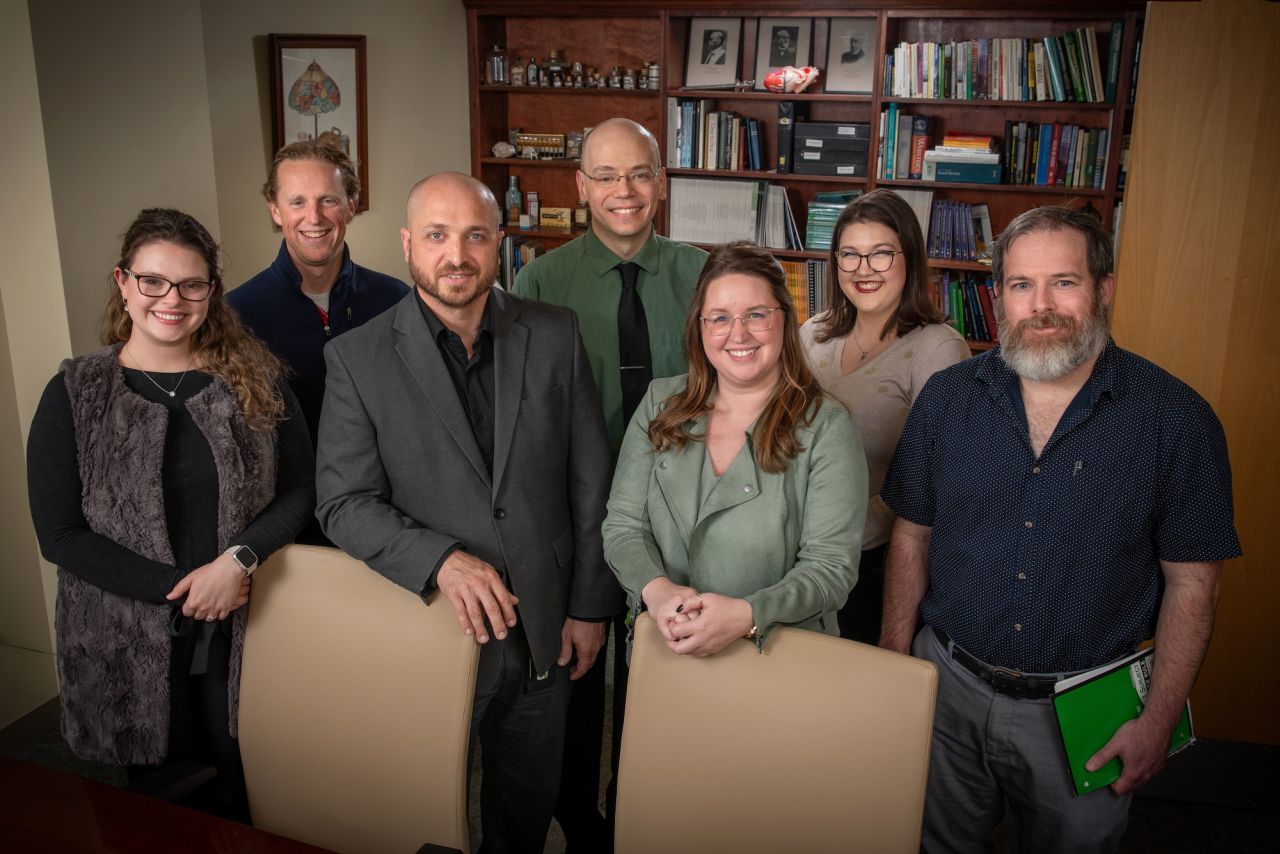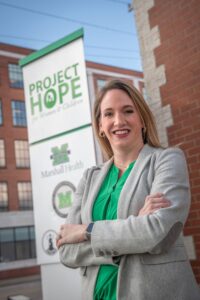Leading the Charge
The School of Medicine is at the forefront of addiction medicine, combining comprehensive treatment, innovative research and specialized training to address the complex issue of substance use disorder.

For communities grappling with the devastating effects of addiction, the Joan C. Edwards School of Medicine represents a beacon of hope, driven by its commitment to multidisciplinary, multisector collaboration.
“I think the biggest thing we do differently here is we really do collaborate across sectors — at the political level, at the local level and with the various treatment programs in the area,” said Lyn O’Connell, PhD, assistant professor of family and community health and associate director of the Division of Addiction Sciences at the School of Medicine and Marshall Health. “And the reason that is essential is because substance use does not occur in a silo — it impacts the entire community.”
In the Division of Addiction Sciences, medical students, residents and fellows work closely with local officials and programs to combat the addiction crisis impacting Appalachia.

“We’re developing innovative models for addressing substance use systemically,” Dr. O’Connell said. “You can’t just treat one part of the problem — you need to treat the entire individual, the entire family, the entire community.”
The 70-plus members of the Division of Addiction Sciences, which is funded largely through federal and state grants and reimbursement for direct services, provide care and treatment at hospitals, homeless shelters, harm reduction programs and other locations in Huntington and surrounding areas. Key initiatives include PROACT (Provider Response Organization for Addiction Care & Treatment), a single-accessible service hub for individuals in recovery, and Project Hope for Women & Children, a comprehensive residential treatment facility for women with substance use disorder and their children.
Much of the division’s clinical research is centered on opioid use during pregnancy — a leading issue in West Virginia, which has the nation’s highest rate of neonatal abstinence syndrome (NAS). Under the direction of Todd Davies, PhD, associate professor of family and community health and associate director of research, students are studying the predictors of NAS in infants, how NAS affects the developing brain, drug interactions and drug metabolism and the role of genetics in addiction. A new clinical trial aims to evaluate the safety and efficacy of oral lofexidine, a non-opioid medication, in newborns who suffer from neonatal opioid withdrawal syndrome (NOWS).
The division uses a research model that is “truly unique to Marshall,” Dr. Davies said, in which highly trained clinicians and scientists are involved in every aspect of the process. “Because we’re dealing with a population that is vulnerable and a disease that is complicated, we’ve created a unique model for how we conduct translational research,” he said. “Substance use disorder is comprehensive — there’s a significant behavioral health portion, it requires significant medical intervention and social intervention — and we’ve developed a system that encompasses all of that.”
The division’s epigenetics research — looking at epigenetic biomarkers as risk factors to determine whether a patient will require earlier, more extensive intervention — is setting Marshall’s work apart on a global scale. “We are making advancements in addiction here that, in the next few years, will change the way substance use disorder is treated and how success in recovery is measured,” Dr. Davies said.
For family physicians seeking specialized training and board certification in addiction medicine, the division offers a one-year addiction medicine fellowship. Fellows develop expertise in “the full range of conditions related to addictive behavior,” said James B. Becker, MD (’93), fellowship program director.
“The Huntington community has embraced a comprehensive approach to addressing addiction, which provides an excellent environment for training fellows,” said Dr. Becker, who also serves as professor and vice dean for government relations and health care policy at the School of Medicine. “It allows trainees to gain in-depth experience and develop the skills they need to be successful anywhere.”
Dr. Becker, who has practiced addiction medicine for more than 25 years, said family medicine physicians are uniquely positioned to identify and address the early signs of addiction.
“The earlier you recognize a problem developing, the sooner you can get a patient into effective treatment,” he said. “If you wait until major concerns or serious consequences arise, you’ve waited too long. Family doctors serve as the first line of defense, alongside family and friends, in identifying and addressing addiction early.”
The fellowship provides hands-on experience in all addiction sciences programs at the School of Medicine. On a policy level, fellows take an active role in the Mayor’s Office of Drug Control Policy and the Governor’s Council on Substance Abuse and Treatment. To further strengthen multisector collaboration, the Division of Addiction Sciences hosts weekly didactic sessions that keep clinicians, local partners and recovery advocates informed of emerging challenges and trends.
“People share what they’re seeing in the community, what they’re seeing in the clinics and what they’re seeing on the academic side of things,” Dr. O’Connell said. “If there’s an emerging drug or a new problem, we’re hearing that from the city or from law enforcement and we’re able to adjust more rapidly and respond more effectively. Information-sharing is key.”
This story was published in the 2024/2025 edition of MarshallMedicine magazine. Read the complete issue here.
